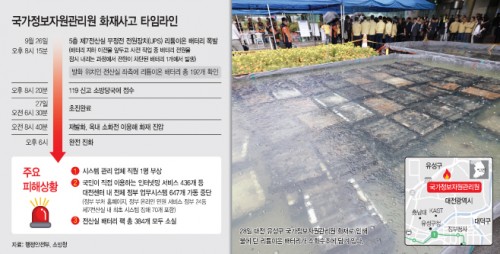 |
| The National Information Resources Service in Daejeon, where a fire crippled major government IT networks on September 28. / Source: Yonhap News |
A massive fire at the National Information Resources Service in Daejeon has paralyzed key government IT systems, halting services across finance, welfare, healthcare, and environment ministries. Despite emergency measures, full restoration is expected to face serious delays, raising fears of prolonged administrative paralysis and growing public inconvenience.
According to the Ministry of Economy and Finance on September 28, Deputy Prime Minister and Finance Minister Koo Yoon-cheol convened a Central Disaster and Safety Countermeasures Headquarters meeting to review progress in restoring 13 critical systems, including the digital budgeting platform dBrain+, the public fund system e-Naradoum, and the ministry’s website. Officials warned that recovery of government authentication certificates (GPKI) and internal approval networks could take significant time, though temporary workarounds are being used.
The Ministry of Health and Welfare reported that key portals such as “Bokjiro” and the Social Security Information System were down, blocking online applications for welfare services. While benefits like basic living allowances, child support, and pensions have already been disbursed, new applications are suspended. The national cremation reservation system “e-Haneul” has also stopped, compounding public frustration.
The medical sector has been severely affected. The medical record transmission network has frozen, disrupting hospital-to-hospital data sharing, while the suspension of KONOS, the national organ transplant system, has halted organ matching. Infectious disease reporting has reverted to manual entry after surveillance networks went offline.
The Ministry of Environment confirmed 21 internal and external systems were impacted, though most public-facing services remain intact. The Ministry of Oceans and Fisheries partially restored shipping and port logistics systems via its disaster recovery center, but passenger verification systems are still down, causing delays.
The Ministry of Science and ICT raised its crisis alert to the highest “serious” level and activated the central emergency headquarters, while emergency text alerts were sent to citizens after disruptions hit postal banking and mail services.
President Lee Jae-myung convened an emergency meeting, ordering ministries to “focus all efforts on minimizing public inconvenience” and to draw up structural safeguards to prevent recurrence. “Submit urgent measures addressing governance and infrastructure issues to ensure this never happens again,” he said.
The government said more than 99% of core security equipment has been restored, with 551 unaffected systems being reactivated first. However, with 740 servers and 384 lithium-ion batteries destroyed in the blaze, officials warned that full recovery of the national data infrastructure will take considerable time.
Most Read
-
1
-
2
-
3
-
4
-
5
-
6
-
7





















